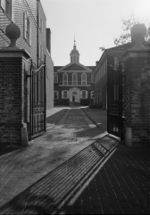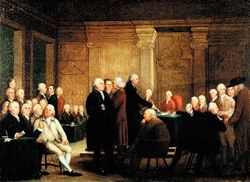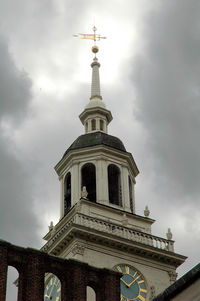First Continental Congress
|
The First Continental Congress was a convention of delegates from twelve of the thirteen North American colonies that met on September 5, 1774, at Carpenters' Hall in Philadelphia, Pennsylvania, early in the American Revolution. Called in response to the passage of the Coercive Acts (also known as Intolerable Acts by the Colonial Americans) by the British Parliament, the Congress was attended by 56 members appointed by the legislatures of twelve of the Thirteen Colonies, the exception being the Province of Georgia, which did not send delegates. At the time, Georgia declined to send a delegation because it was seeking help from London in pacifying its smoldering Indian frontier.[1]
The Congress met briefly to consider options, including an economic boycott of British trade; publishing a list of rights and grievances; and petitioning King George for redress of those grievances.
The Congress also called for another Continental Congress in the event that their petition was unsuccessful in halting enforcement of the Intolerable Acts. Their appeal to the Crown had no effect, and so the Second Continental Congress was convened the following year to organize the defense of the colonies at the onset of the American Revolutionary War. The delegates also urged each colony to set up and train its own militia.
Contents |
Background
Convention

The Congress met from September 5 to October 26, 1774. From September 5 through October 21, Peyton Randolph presided over the proceedings; Henry Middleton took over as President of the Congress for the last few days, from October 22 to October 26. Charles Thomson, leader of Philadelphia Committee of Correspondence, was selected to be Secretary of the Continental Congress.[2]
Galloway's Plan of Union
Patrick Henry already considered government dissolved, and was seeking a new system.[3] Pennsylvania delegate Joseph Galloway sought reconciliation with Britain. He put forth a "Plan of Union", which suggested an American legislative body be formed, with some authority, and whose consent would be required for imperial measures.[3] John Jay, Edward Rutledge, and other conservatives supported Galloway's plan.[4] (Galloway would later join the Loyalists).
Accomplishments
The Congress had two primary accomplishments. The first was a compact among the colonies to boycott British goods beginning on December 1, 1774.[5] The West Indies were threatened with a boycott unless the islands agreed to non importation of British goods.[6] Imports from Britain dropped by 97 percent in 1775, compared with the previous year.[5] Committees of observation and inspection were to be formed in each colony for enforcement of the Association. All of the colonial Houses of Assembly approved the proceedings of the congress with the exception of New York.[7]
If the "Intolerable Acts" were not repealed, the colonies would also cease exports to Britain after September 10, 1775.[5] The boycott was successfully implemented, but its potential for altering British colonial policy was cut off by the outbreak of the American Revolutionary War.
The second accomplishment of the Congress was to provide for a Second Continental Congress to meet on May 10, 1775. In addition to the colonies which had sent delegates to the First Continental Congress, the Congress resolved on October 21, 1774 to send letters of invitation to Quebec, Saint John's Island (now Prince Edward Island), Nova Scotia, Georgia, East Florida, and West Florida.[8] However, letters appear to have been sent only to Quebec (three letters in all). None of these other colonies sent delegates to the opening of the second Congress, though a delegation from Georgia arrived the following July.[9]
List of delegates
| # | Name | Colony | Notes |
|---|---|---|---|
| 1 | Nathaniel Folsom | New Hampshire | |
| 2 | John Sullivan | New Hampshire | |
| 3 | John Adams | Massachusetts | |
| 4 | Samuel Adams | Massachusetts | |
| 5 | Thomas Cushing | Massachusetts | |
| 6 | Robert Treat Paine | Massachusetts | |
| 7 | Stephen Hopkins | Rhode Island | |
| 8 | Samuel Ward | Rhode Island | |
| 9 | Silas Deane | Connecticut | |
| 10 | Eliphalet Dyer | Connecticut | |
| 11 | Roger Sherman | Connecticut | |
| 12 | James Duane | New York | |
| 13 | John Jay | New York | |
| 14 | Philip Livingston | New York | |
| 15 | Isaac Low | New York | |
| 16 | Simon Boerum | New York | |
| 17 | John Haring | New York | |
| 18 | Henry Wisner | New York | |
| 19 | William Floyd | New York | |
| 20 | John Alsop | New York | |
| 21 | Stephen Crane | New Jersey | |
| 22 | John De Hart | New Jersey | |
| 23 | James Kinsey | New Jersey | |
| 24 | William Livingston | New Jersey | |
| 25 | Richard Smith | New Jersey | |
| 26 | Edward Biddle | Pennsylvania | |
| 27 | John Dickinson | Pennsylvania | |
| 28 | Joseph Galloway | Pennsylvania | |
| 29 | Charles Humphreys | Pennsylvania | |
| 30 | Thomas Mifflin | Pennsylvania | |
| 31 | John Morton | Pennsylvania | |
| 32 | Samuel Rhoads | Pennsylvania | |
| 33 | George Ross | Pennsylvania | |
| 34 | Thomas McKean | Delaware | |
| 35 | George Read | Delaware | |
| 36 | Caesar Rodney | Delaware | |
| 37 | Samuel Chase | Maryland | |
| 38 | Robert Goldsborough | Maryland | |
| 39 | Thomas Johnson | Maryland | |
| 40 | William Paca | Maryland | |
| 41 | Matthew Tilghman | Maryland | |
| 42 | Richard Bland | Virginia | |
| 43 | Benjamin Harrison | Virginia | |
| 44 | Patrick Henry | Virginia | |
| 45 | Richard Henry Lee | Virginia | |
| 46 | Edmund Pendleton | Virginia | |
| 47 | Peyton Randolph | Virginia | |
| 48 | George Washington | Virginia | |
| 49 | Richard Caswell | North Carolina | |
| 50 | Joseph Hewes | North Carolina | |
| 51 | William Hooper | North Carolina | |
| 52 | Christopher Gadsden | South Carolina | |
| 53 | Thomas Lynch, Jr. | South Carolina | |
| 54 | Henry Middleton | South Carolina | |
| 55 | Edward Rutledge | South Carolina | |
| 56 | John Rutledge | South Carolina |
See also
- List of delegates to the Continental and Confederation congresses
- Papers of the Continental Congress
- Timeline of United States revolutionary history (1760–1789)
- Second Continental Congress
Notes
- ↑ Ferling, John. (2003). A Leap in the Dark. Oxford University Press. p. 112.
- ↑ Risjord, Norman K. (2002). Jefferson's America, 1760-1815. Rowman & Littlefield. p. 114.
- ↑ 3.0 3.1 Greene, Evarts Boutell (1922). The Foundations of American Nationality. American Book Company.. p. . 434.
- ↑ Miller, Marion Mills (1913). Great Debates in American Hist: From the Debates in the British Parliament on the Colonial Stamp. Current Literature Pub. Butts. Co. p. 91.
- ↑ 5.0 5.1 5.2 Kramnick, Isaac (ed); Thomas Paine (1982). Common Sense. Penguin Classics. p. 21.
- ↑ Ketchum, pg. 262
- ↑ Launitz-Schurer pg. 144
- ↑ Worthington C. Ford, et al., Library of Congress (United States), ed (1774 (printed 1901)). Journals of the Continental Congress, 1774-1789. p. 101. http://memory.loc.gov/cgi-bin/ampage?collId=lljc&fileName=001/lljc001.db&recNum=109. Retrieved Feb. 7, 2010.
- ↑ Worthington C. Ford, et al., ed. Journals of the Continental Congress, 1774–1789. pp. 2:192–193. http://memory.loc.gov/cgi-bin/query/r?ammem/hlaw:@field(DOCID+@lit(jc00266)).
References
- Bancroft, George. History of the United States of America, from the discovery of the American continent. (1854-78), vol 4-10 online edition
- Burnett, Edmund C. (1975) [1941]. The Continental Congress. Greenwood Publishing. ISBN 0-8371-8386-3.
- Henderson, H. James (2002) [1974]. Party Politics in the Continental Congress. Rowman & Littlefield. ISBN 0-8191-6525-5.
- Launitz-Schurer, Loyal Whigs and Revolutionaries, The making of the revolution in New York, 1765-1776, 1980, ISBN 0-8147-4994-1
- Ketchum, Richard, Divided Loyalties, How the American Revolution came to New York, 2002, ISBN 0805061207
- Miller, John C. Origins of the American Revolution (1943) online edition
- Puls, Mark, Samuel Adams, father of the American Revolution, 2006, ISBN 1403975825
- Montross, Lynn (1970) [1950]. The Reluctant Rebels; the Story of the Continental Congress, 1774–1789. Barnes & Noble. ISBN 0-389-03973-X.
- Primary sources
- Peter Force, ed. American Archives, 9 vol 1837-1853, major compilation of documents 1774-1776. online edition
External links
- The Continental Congress - History, Declaration and Resolves, Resolutions and Recommendations
- Full text of Journals of the Continental Congress, 1774-1789
- Papers of the Continental Congress (Digitized Original Documents)
|
||||||||||||||||||||||
|
|||||||||||||||||
| Preceded by - |
Legislature of the United States 5 September 1774 to 26 October 1774 |
Succeeded by the Second Continental Congress |

